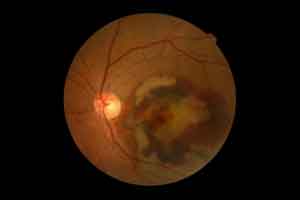- Home
- Editorial
- News
- Practice Guidelines
- Anesthesiology Guidelines
- Cancer Guidelines
- Cardiac Sciences Guidelines
- Critical Care Guidelines
- Dentistry Guidelines
- Dermatology Guidelines
- Diabetes and Endo Guidelines
- Diagnostics Guidelines
- ENT Guidelines
- Featured Practice Guidelines
- Gastroenterology Guidelines
- Geriatrics Guidelines
- Medicine Guidelines
- Nephrology Guidelines
- Neurosciences Guidelines
- Obs and Gynae Guidelines
- Ophthalmology Guidelines
- Orthopaedics Guidelines
- Paediatrics Guidelines
- Psychiatry Guidelines
- Pulmonology Guidelines
- Radiology Guidelines
- Surgery Guidelines
- Urology Guidelines
Now smartphone app for monitoring macular degeneration & diabetic retinopathy

Patients with age-related macular degeneration or diabetic retinopathy who used a mobile application to test their vision at home got comparable results to in-office vision testing, according to research presented today at AAO 2017, the 121st Annual Meeting of the American Academy of Ophthalmology. The findings suggest that the smartphone app may help patients take better care of their vision.
Ophthalmologists - physicians who specialize in medical and surgical eye care - have effective treatment options for AMD and diabetic retinopathy that slow or prevent vision loss. But treatment is most effective when it's given at the earliest signs of disease.
That's why ophthalmologists often ask their patients to check their vision at home with a test called the Amsler grid. It is a simple square on a sheet of paper containing a grid pattern and a dot in the middle. When used correctly, it can show problem spots in a patient's field of vision. However, research shows that patients often fail to use the Amsler grid between office visits, and patients find it difficult to use effectively.
The app, known as Checkup, is designed to engage patients with their health care. Patients use it to assess their vision as often as their ophthalmologist prescribes. The voice-activated app also sends reminders to a patient's device if they forget to test on schedule. Results of the test are sent in real time to a secure cloud-based data warehouse. The ophthalmologist can view the results, and contact the patient if they detect a deterioration in their vision.
Researchers at Northern California Retina Vitreous Associates in Mountain View, Calif., wanted to find out if a smartphone app can monitor patients' vision at home as accurately as vision testing in the ophthalmologist's office, so they asked 27 patients with either AMD or diabetic retinopathy to use the app for two months.
Patients tested their vision at home using the app and were then re-tested in the office. There was the strong agreement between the Checkup app and the in-office tests for both visual acuity and Amsler grid testing. Every patient reported that it was easy to use.
Linda Redington, 57, and her 83-year-old mother, Ethel Redington, were part of the study. They both have AMD. They said it was easy to set up on their phones and easy to use. Both Linda and Ethel tested their vision with a basic visual acuity test and the Amsler grid test.
"I never missed a day," Linda Redington said. "It was easy and it didn't take a big chunk out of the day. It took just five minutes."
She says that the Amsler grid test on the app was easier to use than the static, black dot on a piece of paper. Instead of wielding a pen and piece of paper, the app serves up a red, flashing light that she simply taps with her finger.
"We're excited about the potential of this technology to improve patient care," said lead researcher, Rahul N. Khurana, M.D. "More and larger studies are required to make sure it works as well as our small study showed. But we found that it encouraged patients to take a more active role in their care, and they found it easy to use."

Disclaimer: This site is primarily intended for healthcare professionals. Any content/information on this website does not replace the advice of medical and/or health professionals and should not be construed as medical/diagnostic advice/endorsement or prescription. Use of this site is subject to our terms of use, privacy policy, advertisement policy. © 2020 Minerva Medical Treatment Pvt Ltd